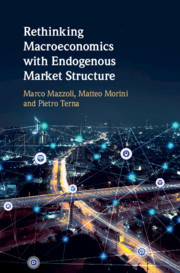Description
Rethinking Macroeconomics with Endogenous Market Structure
Authors: Mazzoli Marco, Morini Matteo, Terna Pietro
An innovative new agent-based macroeconomic framework demonstrating the macroeconomic implications of industrial structure and strategic interactions amongst oligopolistic firms within an economy.
Language: English
Subject for Rethinking Macroeconomics with Endogenous Market Structure:
120.25 €
In Print (Delivery period: 14 days).
Add to cart
Publication date: 12-2019
248 p. · 15.7x23.4 cm · Hardback
248 p. · 15.7x23.4 cm · Hardback
Description
/li>Contents
/li>Biography
/li>
The birth and death of firms is one of the main features of the business cycle. Yet mainstream DGSE macroeconomic models mostly ignore this phenomenon, thereby excluding any potential impact of economic policy on the probability of the birth and death of firms. Those DGSE models that do allow for this phenomenon do so at the cost of drastic simplifications, which effectively rule out causal links between the strategic interaction of industrial firms and the macroeconomy. This innovative new book develops a bottom-up, agent-based framework that shows how strategic interactions at the level of oligopolistic firms, and even at the level of individuals, affect entire industrial sectors and the equilibrium of the macroeconomy. It will appeal to academic researchers and graduate students working in computational economics, agent-based modelling and econophysics, as well as mainstream economists interested in learning more about alternatives to DGSE models in macroeconomics.
Introduction; Part I. Theory: 1. Industrial structure and the macroeconomy: a few premises for a macromodel; 2. Industrial structure and the macroeconomy: the macroeconomic model and its algebraic framework; Part II. Model: 3. A computable market model: the structure of the agent-based simulation; 4. The results of the simulation agent-based model; 5. The model facing empirical data; Conclusions; Appendices: Appendix A. The structure of an atomistic simplified Hayekian market; Appendix B. The acrostics of the simulation model and its parameters; References; Biographical notes.
Marco Mazzoli is Associate Professor of Economic Policy at Università degli Studi di Genova. He has published various papers in international journals, as well as the monograph Credit, Investments and the Macroeconomy (Cambridge, 1998).
Matteo Morini is currently a postdoctoral researcher at the Universität Koblenz-Landau, Germany, and holds a research scientist position at Università degli Studi di Torino, Italy; he also teaches in the Collegio Carlo Alberto postgraduate programme and sits on the board of directors (as vice-president) of the Swarm Development Group. He has co-authored and co-edited two books on complexity and agent-based modelling.
Pietro Terna is a retired professor of Università degli Studi di Torino, Italy, where he was a full Professor of Economics. His research work has been pioneering the use of Swarm to create social simulations with agent-based models. He has also prepared a new agent-based simulation tool in Python (Swarm-Like Agent Protocol in Python), SLAPP.
Matteo Morini is currently a postdoctoral researcher at the Universität Koblenz-Landau, Germany, and holds a research scientist position at Università degli Studi di Torino, Italy; he also teaches in the Collegio Carlo Alberto postgraduate programme and sits on the board of directors (as vice-president) of the Swarm Development Group. He has co-authored and co-edited two books on complexity and agent-based modelling.
Pietro Terna is a retired professor of Università degli Studi di Torino, Italy, where he was a full Professor of Economics. His research work has been pioneering the use of Swarm to create social simulations with agent-based models. He has also prepared a new agent-based simulation tool in Python (Swarm-Like Agent Protocol in Python), SLAPP.
© 2024 LAVOISIER S.A.S.
These books may interest you

MacroeconomicsAn Introduction 115.27 €

MacroeconomicsAn Introduction 39.35 €


